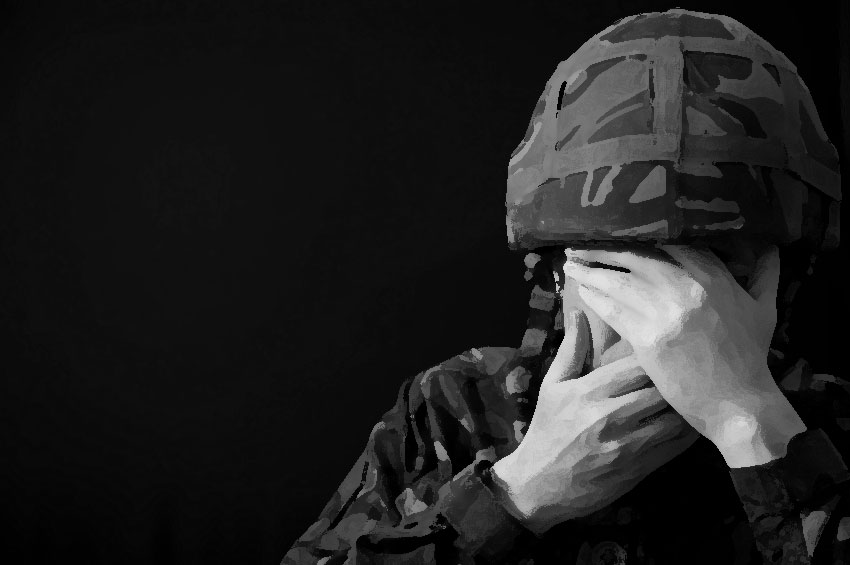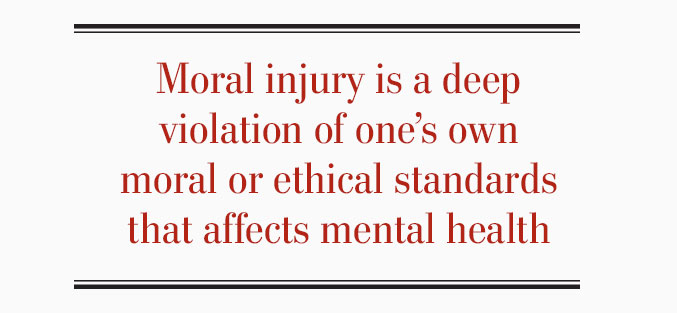
The realization is growing that the reason some military members and veterans do not benefit from post-traumatic stress disorder treatments is that their symptoms are not caused by, or not solely caused by, PTSD.
There is an overlap of symptoms of PTSD, concussion and traumatic brain injury, mefloquine toxicity and major depressive disorder. Now research has added moral injury to the list.
Moral injury is a deep violation of one’s own moral or ethical standards that affects mental health. It has a range of associated feelings, such as guilt, shame, betrayal, disgust, contempt, helplessness and regret.
It can occur from being victimized or taking part in something immoral or unethical. Examples include feeling at fault for the death of a comrade or guilty over the execution of helpful civilians; shooting child suicide bombers or soldiers; being unable to come to the aid of a comrade under fire; being unable to prevent a massacre or witnessing or participating in atrocities; being raped or not reporting a rape; and following illegal or immoral orders.
Moral injury is recognized by the Canadian Armed Forces as one of the causes of operational stress injuries, along with events that provoke terror, horror or hopelessness and accumulated stress and grief.
It is not yet known what percentage of military personnel and veterans who go on to develop PTSD also have a moral injury. But current treatment for PTSD focuses on fear, while shame, guilt and feelings of betrayal are major symptoms of moral injury. Some researchers at the Canadian Institute for Military and Veteran Health Research (CIMVHR) forum in September argued that moral injury should be treated separately and first, to make PTSD treatment more effective.
Evidence is growing of a link between moral injury and PTSD, depression and suicidal thoughts, said Defence Research and Development Canada (DRDC) scientist Anthony Nazarov. Preliminary results of a survey of Canadian personnel deployed overseas between 2001 and 2013 show that 58 per cent were exposed to events that heighten the risk of moral injury; 39 per cent were unable to help ill or injured women or children; a third felt responsible for the death of a comrade or ally; and six per cent had difficulty distinguishing between combatants and non-combatants.
“Current treatment interventions for PTSD have centred predominantly on fear-based symptoms and may not be sufficient” for those with moral injuries, said Nazarov.
In prolonged exposure therapy, for example, traumatic events are described repeatedly in a slow process of desensitization. However, repeatedly revisiting a moral injury can reinforce feelings of guilt, shame, betrayal and worthlessness.

The Citrus Heights Vet Center in California, which specializes in military readjustment counselling, treats PTSD and moral injury as separate conditions requiring overlapping and simultaneous interventions.
“Clinical settings often lack the tools for treating complex concepts like forgiveness and morality that espouses moral injuries,” said the centre’s presentation. It urges development of standardized screening tools and evidence-based treatment that targets moral injury. Without these tools, “we will continue to view the mental and moral health of our veterans through the wrong lenses, leading to incomplete diagnoses, with the wrong treatments in the hands of the wrong people.”
In moral injury, “the soul is shattered,” said CIMVHR associate director Stéphanie Bélanger. Sorting out moral injury from PTSD is messy. How does moral injury occur? Do PTSD and moral injury happen at the same time?
PTSD itself may contribute to moral injury, said psychologist Margaret McKinnon of McMaster University, reporting on ongoing studies of moral injury in military members and veterans by the Department of National Defence and half a dozen universities and research institutes. PTSD hampers the ability to recognize certain emotions in others, like sadness, fear or happiness, but ramps up recognition of anger.
Education may be key in preventing moral injury for some.
Moral and ethical training can help prepare military members for today’s challenging moral landscape, said DRDC researcher Megan Thompson. Military personnel are called upon to make complex decisions “in real operations in very difficult settings, often under high time pressure, with operational ambiguity and the various stressors that are part of military missions.
“Military ethics are one crucial foundation for the profession of arms,” Thompson said. Ethics separate soldiers from murderers and warfare from slaughter. They help protect civilians and provide unit cohesion.
The importance of ethical education was highlighted by U.S. research following revelations in 2004 of abuse and torture of detainees in a prison in Iraq. Less than half of U.S. soldiers interviewed afterward agreed non-combatants should be treated with respect, more than a third agreed torture was acceptable to save a team member and 10 per cent had participated in some form of immoral behaviour, including unnecessary hitting or kicking of civilians or destruction of their property.
Dry runs through real scenarios faced by officers in the field can help military personnel recognize when moral issues are at play, tease out conflicting issues and help in making judgements that reflect underlying values.
We can expect to hear more about the prevalence of this recently recognized injury. Better assessment techniques are already being developed, and evidence-based treatment is sure to follow. It will take time to determine if prevention strategies, such as education in military morals and ethics, do cut down on the number of moral injuries among service members. Still on the research horizon is what can be done for those who have suffered for years, even decades, without a proper diagnosis.
Moral injury will be on researchers’ agendas for decades to come.
Advertisement












